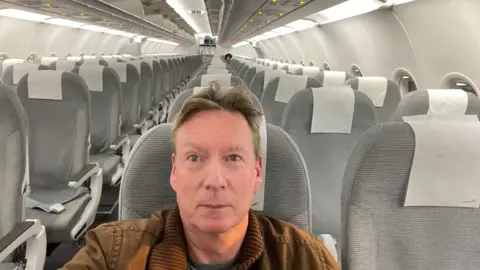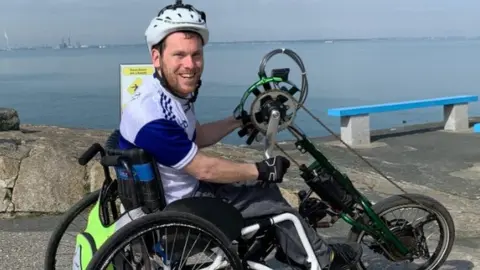Frank Gardner: 'It happened again' - Why are wheelchair-users left on planes?
 Frank Gardner
Frank GardnerIf you use Twitter you may have seen Frank Gardner tweet his frustration at being left on a plane at the weekend after Heathrow Airport failed to deliver his wheelchair to him when he landed. It's a problem lots of wheelchair-users have faced - but what causes it?
"It's happened again. Stuck on an empty plane at Heathrow airport long after everyone else is off," Frank angrily typed on Sunday night from a runway at the UK's largest airport having arrived from Estonia via Helsinki. "'No staff to get my wheelchair off the plane'. I am SO disappointed."
The security correspondent's tweet was liked 43,400 times as followers sympathised or expressed their shock at the incident.
While many wheelchair-users told the BBC's Access All podcast they had often experienced similar incidents, Heathrow Airport cited Covid-19 as the problem.
Ben Furner experienced the same thing just weeks earlier at a different British airport. He was left on a plane while someone went in search of his mobility scooter.
"It had been agreed that the mobility scooter would be made available to me at the entrance of the plane, but there was nobody to fetch it up, so I was left."
He was offered the use of an airport wheelchair and told he could go to baggage reclaim to collect his scooter.
But Ben explains this is unacceptable. Wheelchairs are often customised and built to personal specifications and a generic, ill-fitting, wheelchair won't necessarily support someone in a safe and comfortable way.
In the end, when the new crew boarded the plane to prepare for the next flight and found Ben still sitting there, the captain intervened and arranged for his scooter to be retrieved.
"I was lucky because the captain took a personal and direct interest...that of course, shouldn't be required."
According to the Civil Aviation Authority, the UK's regulator, the responsibility lies with the airport to provide assistance to passengers when they are on the ground. That includes retrieving wheelchairs from the hold and returning them to passengers who have landed.
When the system doesn't work, or the communication breaks down, it's frustrating and it's not always a one-off.
"This is now the fourth time that this has happened to me in just over four years," Frank sighs.

How do you book (and complain) about airport assistance?
- The UK government recommends passengers request assistance through their airline, tour operator or travel agent at least 48 hours before travel
- If a passenger has not pre-notified, assistance will always still be provided but you might have to wait longer to be helped
- If things go wrong and you're unhappy, the Civil Aviation Authority (CAA) recommends you take your complaint directly to the airline or airport
- If you remain dissatisfied, you can refer your complaint to an alternative dispute resolution (ADR) body which provides alternative methods, such as mediation and conciliation, instead of going to court

Heathrow Airport says it wants all passengers to have a "seamless journey" and it was "disappointed" for Frank. "We apologise for this," it said, citing Covid-19 and the subsequent impact as the reason.
"As the airport rebuilds post-pandemic, all organisations across the airport are scaling-up resources so that we can get back to operating at a more normal level as quickly as possible.
"Unfortunately, the delay Mr Gardner experienced was a result of the airline's ground handling agents struggling with a colleague shortfall."
Improvements to passenger access support at airports was on the horizon in 2018 when the government announced the launch of Aviation 2050, its consultation and strategy for the next three decades of air travel, but that initiative has also stalled due to Covid-19.
The results of the consultation were due to be released in 2019 with a focus on helping the industry thrive post-Brexit, improve its impact on the environment and improve access with the introductory report admitting "there is more work to do".
But many disabled passengers remain unsatisfied.
According to the document, more than 3 million requests were made for special assistance in the UK in 2017, a figure which is only "increasing".
It says 25% of passengers who fly have a disability or health condition and, of those, 60% find it difficult to access and use airports.
It admits there are a "number of common challenges" including a "lack of clarity about roles and responsibilities across airlines, airports and airside services".
This is the biggest bugbear wheelchair-users have, but although Aviation 2050 was set to be published in 2019, it's still not been seen, three years on.
The Department for Transport has admitted that due to "unprecedented challenges" related the the pandemic, a formal response to the Aviation 2050 consultation has not been published.
It says it will now publish a strategy, in due course, which will focus on the next 10 years, instead.
 Ellis Palmer
Ellis Palmer"While these are challenging times for the industry, disabled passengers deserve better," it said in a statement.
It says it's ready and "determined" to make improvements using its Aviation Consumer Policy Reform Consultation, a different strategy which includes a suggestion of greater financial insurance if wheelchairs are damaged on UK domestic flights - another gripe for many wheelchair-users. The result of this consultation is due in the next few weeks.
Ellis Palmer, a wheelchair-using journalist, says he finds plane travel "anxiety-inducing" but is sanguine.
"There's no point stressing about being the last person on the plane because ultimately they have to bring that chair up to you at some point," he says.
From his experience he finds smaller, regional, airports to be "absolutely fantastic" at assistance, while international hubs are more difficult.
And he finds Spanish airports particularly stress-free where access workers wear yellow t-shirts.
"They're really easy to find when you're going around the airport in a way that they're just not at UK airports."
For Frank, while his tweets might seem a harmless way to express frustration, they have been effective at making change happen in the past.
After a tweet in 2018 about this very situation - being left on a plane - the BBC journalist forced Heathrow to change its policy which is why wheelchairs are now delivered to plane doors rather than the terminal, even if it doesn't always work.
He says he has further ideas on how this system can be improved.
"To me, this is about allocating the right resources where they're needed," he says, suggesting the departure airport could inform the destination airport that a passenger might need assistance, before the plane has even left the ground.
"That would be a way of pre-empting this," Frank says. "It's not that they don't care, but it is a huge busy airport and they are frankly, not at the moment, up to the task of giving disabled passengers the service that they deserve."
After his latest apology from Heathrow, Frank quickly updated his followers: "Clearly still a way to go to stop this happening. Every time it happens to me it's happening to others around the UK."
You can listen to the podcast and find information and support on the Access All page

